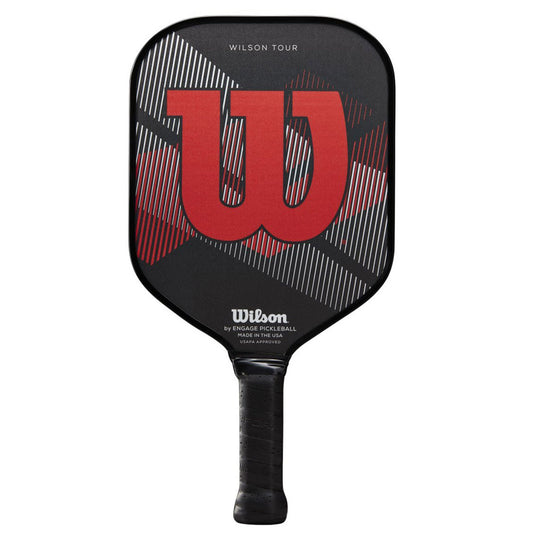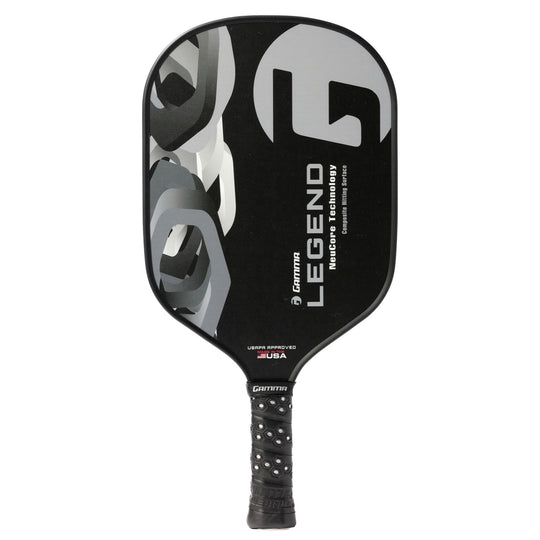Paddles
Let's get serious about fun. Pickleball is fun but pickleball paddles, the most important piece of equipment in the game, are serious business.
When you play pickleball the choice of a pickleball paddle makes a big difference for players at every level from beginner to pro. Sometimes finding the right paddle can feel confusing, but the easy way to purchase a great pickleball paddle is to start with our Buying Guide and then get out and hit a ball or two (thousand)!
Parts of Pickleball Paddles
The Pickleball Paddle Face
Pickleball paddle faces come in a variety of types, each with its own unique characteristics. Here are the most common types of pickleball paddle faces:
1) Solid Wood
New pickleball players will sometimes buy the absolute cheapest paddles they can find, and solid wood paddles are definitely that. However, you will be better served to spend a bit more money on one of the next three surfaces.
2) Graphite Face
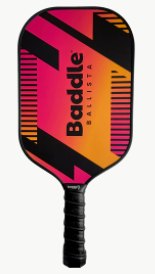
Graphite: Graphite faces are lightweight and provide excellent control and touch on the ball. They are often used by players who prefer finesse and control over power. Thanks to a highly competitive environment for paddle makers, the cost of lightweight graphite has come down. This kind of pickleball equipment features control and maybe spin if the player is skilled enough.
3) Fiberglass Composite
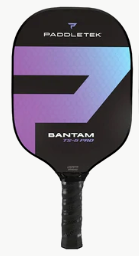
For players who search for power, fiberglass will add a bit of weight but really enhance power. With a bit less durability than carbon based faces, players will discover this kind of paddle can be tougher to control. Composite faces are made of a combination of materials, such as fiberglass, carbon fiber, or aramid. They are more durable than graphite faces and provide a good balance of power and control.
4) Carbon Fiber
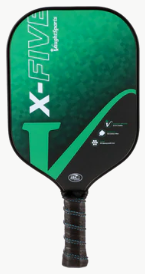
Generally thought of as creating a very versatile paddle, this is similar but not identical to graphite. In a sport that values finesse and power, if you are willing to pay a somewhat higher price for these really advanced technologies, it is hard to go wrong with carbon fiber.
I's important to choose a paddle face type that suits your playing style and skill level. Try out different types of paddles and faces to see which one works best for you.
Core Material
Pickleball paddle cores come in different materials, each with their own characteristics that can affect the performance of the paddle. Here are the most common types of pickleball paddle core materials:
Wood Core
Wooden cores are less common than other types of cores, but they provide a classic feel and are often used by recreational players. They provide good control but may not provide as much power as other types of cores.
Polymer Core
The super light honeycomb core made up of polymer material is a clear leader in the sport. It goes under any of the face materials (other than solid wood) listed above. Polymer cores are the most common type of core material in pickleball paddles. They are made of a honeycomb-shaped polymer material and provide a good balance of power and control. They are also lightweight and absorb shock well, which can help reduce the risk of injury.
Nomex Core
A smaller but passionate group of players are in love with Nomex for the core according to reviews. Thought to provide the ultimate control, it can suffer from creating a noisier paddle unlike the very quiet polymers. Nomex cores are made of a honeycomb-shaped aramid material that is similar to Kevlar. They provide excellent power and are often used by players who hit the ball hard. However, they are heavier than polymer cores and may not provide as much control.
It's important to choose a paddle core material that suits your playing style and skill level. Try out different types of paddles and cores to see which one works best for you.
Grip Circumference
Paddles feature all kinds of different grips but the most important thing is to get the size right. The price is not materially impacted by the grip but players may want to find the best paddle and if the right grip is not available, buy a smaller size and build it up. See our Guide to finding the right grip size.
What to Shop For
Paddle Weight
Pickleball paddles come in a variety of weights, and choosing the right weight can have a significant impact on your playing experience. Here are the most common pickleball paddle weights:
Lightweight
Lightweight paddles typically weigh between 6 and 7.5 ounces. They are often preferred by players who prioritize maneuverability and speed over power. Lightweight paddles are easy to handle, and they can help you move quickly on the court.
Middleweight
Middleweight paddles typically weigh between 7.5 and 8.5 ounces. They are a good choice for players who want a balance of power and control. Middleweight paddles can help you generate more power on your shots while still maintaining good control.
Heavyweight
Heavyweight paddles typically weigh over 8.5 ounces. They are often preferred by players who want maximum power and control. Heavy paddles can help you hit the ball harder and generate more spin, but they can also be more difficult to maneuver.
It's important to choose a paddle weight that feels comfortable for you to use. Lighter paddles are generally easier to handle, but they may not provide as much power. Heavier paddles can be more powerful, but they may be more difficult to control. Try out different weights to see which one feels best for you. Additionally, it's important to note that the USAPA (USA Pickleball Association) has regulations on the maximum weight of a pickleball paddle, which is 8.0 ounces.
Shape
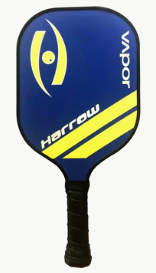
paddles come in a variety of shapes, each with its own characteristics that can affect your playing experience. Here are the most common pickleball paddle shapes:
Widebody
Widebody paddles have a wider hitting surface than standard paddles. They provide a larger sweet spot, making it easier to hit the ball, but they can also be heavier and may be more difficult to maneuver.
Standard
Standard paddles have a more traditional shape, with a slightly narrower hitting surface than widebody paddles. They are a good choice for players who want a balance of power and control.
Oversized
Oversized paddles have a larger hitting surface than widebody paddles. They provide an even larger sweet spot, making it easier to hit the ball, but they can also be heavier and more difficult to maneuver.
Elongated
Elongated paddles have an elongated shape that provides a longer hitting surface. They are a good choice for players who want more reach and power on their shots.
Teardrop
Teardrop: Teardrop paddles have a shape that is wider at the top and narrows at the bottom, resembling a teardrop. They provide a larger sweet spot and more power than standard paddles, but they can be more difficult to control.
It's important to choose a paddle shape that feels comfortable for you to use. Different shapes can affect the balance, sweet spot, and power of the paddle, so try out different shapes to see which one works best for you. Additionally, it's important to note that the USAPA (USA Pickleball Association) has regulations on the maximum paddle width of 8.0 inches and the maximum paddle length of 17 inches.
Style
While personal in terms of taste, a cute or hot design makes a statement that is important to some.
Price
Check out links to our sale page to save a few bucks but find the right weight, face and core first.
Great Customer Service Team
Call us with questions and our fantastic team of pickleball experts can help you with paddles, balls, bags and attire. Sign up for our email notices about sales on our website!

